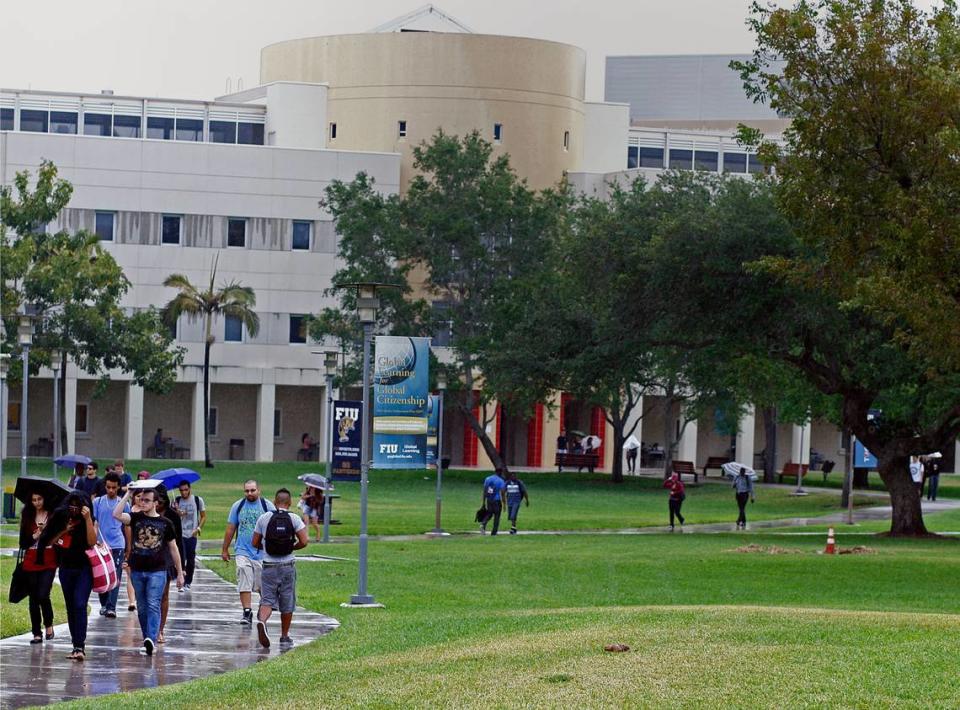Knight investing millions at FIU, UM to stanch Miami’s brain drain

Miami has long dealt with brain drain. A new investment from the Knight Foundation seeks to finally stanch the outflow.
Wednesday, Knight announced it is putting more than $14 million behind efforts at FIU and the University of Miami to beef up engineering, technology, and computing offerings, with an additional $1 million to Baptist Health for a fellowship in healthcare innovation.
FIU will receive $10 million to expand what will now be known as the Knight Foundation School of Computing and Information Sciences, formerly the School of Computing and Information Sciences. A name-change ceremony is slated for Wednesday morning. That funding is part of a larger, $116 million FIU investment to recruit at least 20 new faculty members and 80 new doctoral students in resiliency, sustainability technology, machine learning and artificial intelligence, health and biotechnology and clean energy.
“When you deepen your expertise, you deepen the opportunities for students to get an even more intensive, cutting-edge education,” said FIU President Mark Rosenberg in an interview. “The more faculty you have, the more research you produce....And at most research universities, the quality and impact of the research you have influences the rankings and prestige you have. So this gives us an opportunity to move us up in global competitive rankings, which increases the likelihood of getting more faculty, which increases opportunities for students... it’s a very circular thing.”
FIU continues to face surging demand from students, especially ones from Hispanic backgrounds, for courses in high-end technology fields. But while it may not have difficulty attracting students, it must do more to attract research dollars.
John Volakis, dean of FIU’s College of Engineering & Computing, was blunt about the immediate goal.
“What we’re trying to do is get recognized,” Volakis said.
But that short-term goal is in service of a greater one, he said: ensuring that students in the area are known as the best in their respective fields.
“How else can we expect companies to come here, or be built here, without the talent?” he said, and continued: “You have to be seen by companies, whether in tech or in finance, who are coming to South Florida — they cannot really survive here without having excellent students and excellent universities.”
At the University of Miami, Knight is investing $4.3 million to endow six new faculty chair positions at its Institute of Data Science and Computing (IDSC); until last year, it was known as the Center for Computational Science.
“Think of this as high-test fuel,” said Jeffrey Duerk, executive vice president for academic affairs and provost at the Institute, in a statement. “The Knight Foundation’s gift supporting IDSC’s growth will top off our tank and allow us to go further and go faster.”
In a follow-up interview, Durek said the Knight investment will help create another “win” that is needed to make — and keep — Miami an attractive destination.
“There is great talent here, there is a great university ecosystem here, and now there’s a venture capital buzz and an angel network buzz. All of that creates the hum that will support this (tech) revolution,” he said.
Long view
Miami’s brain-drain issues stretch back decades. As early as 1985, a Miami Herald reader was dismayed that it seemed not one local valedictorian graduating that year had chosen to attend Florida International University.
“I am concerned over the loss of the intellectual power they would have brought to the university,” wrote Jerome C. Engleman, then an industry relations professional for FIU’s School of Hospitality. “It bodes ill to the economic development of Dade County if outstanding students of South Florida high schools eschew FIU and choose colleges both far and near in which to matriculate.”
The Knight Foundation has worked for the past decade to bolster the city’s tech ecosystem. With this latest investment, Knight is signaling a pivot toward boosting Miami’s intrinsic tech-talent quotient.
“What we’ve heard time and again is, we’ve reached a really great point in our startup community, but if we want to grow to the next level, we have to improve and widen the flow of talent coming from Miami,” said current Miami program director Raul Moas.
Moas, a Miami native, is familiar with the city’s long-standing brain-drain problem. And while this latest investment is not a silver bullet, it at least puts the community on the right trajectory.
“It’s okay for Miami to take the long view on this,” he said. “It is good for Miami when a student graduates from FIU and goes to Microsoft in Seattle — of course we hope she comes back, but it also signals something about the quality of talent Miami is producing, and that is important as they consider where they’re opening an office.”
There will always be “drain,” he said. The key is making the gains larger.
“The whole game is to find and build exceptional talent here, and make sure it is our graduates who are the ones fully participating in that tech economy,” Moas said.
Said Knight president and CEO Alberto Ibargüen in a statement: “Miami is emerging as an international tech hub, both through the success of local startups and the recent influx of companies and investors. Demand for technical talent is rising, and we’re just at the beginning of the trajectory. These investments will assure that there will be a deep pool of talent for Miami’s growing tech sector while creating opportunities for Miamians of all backgrounds.”

 Yahoo Sports
Yahoo Sports 